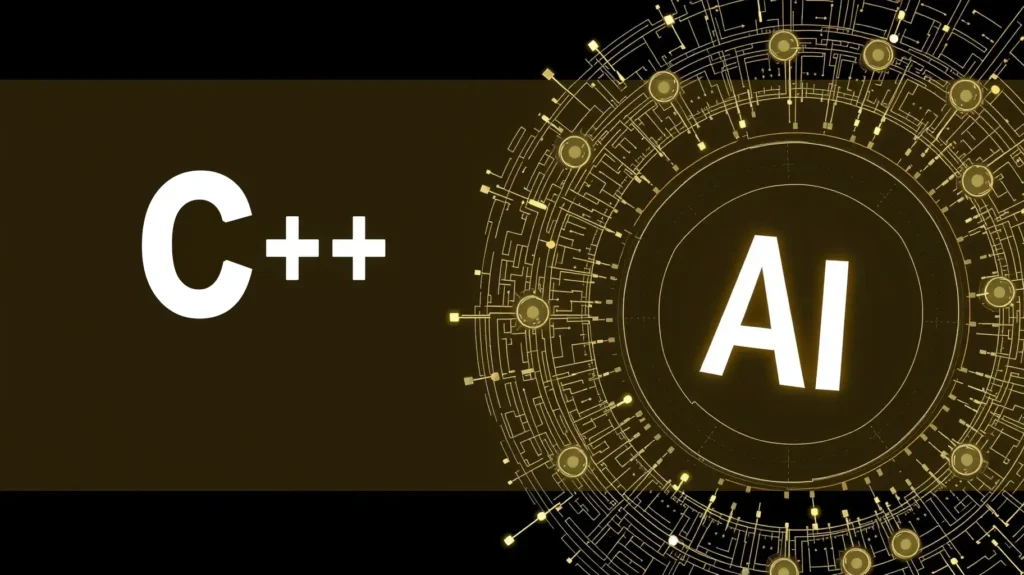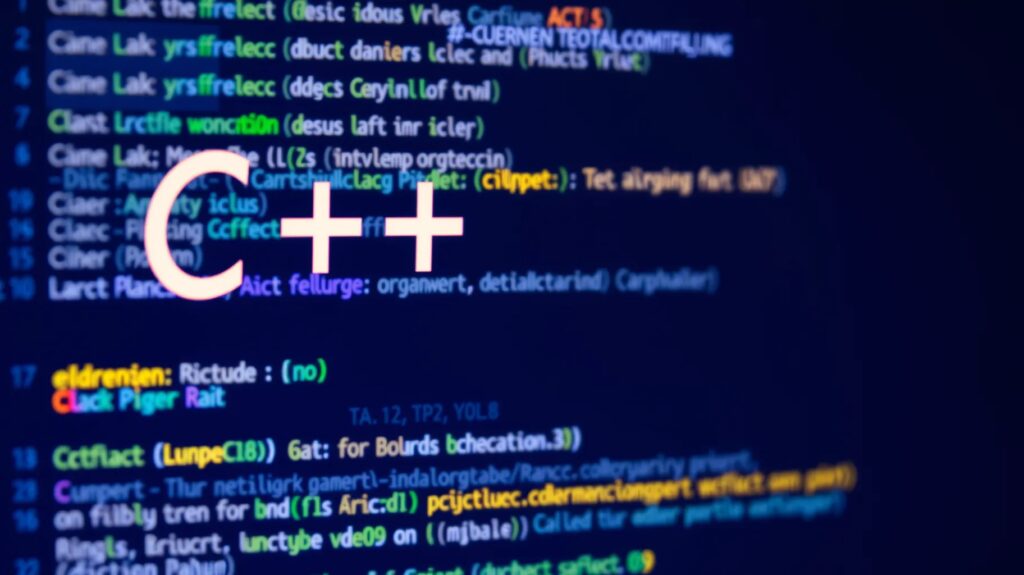
Transitioning to C++ for advanced AI work can feel like a bold leap. If you’re comfortable with Python, it’s easy to stick with it for AI projects. After all, it’s often seen as the go-to language.
But, if you’re looking to take performance to the next level, especially for more complex models and large datasets, learning C++ could be the game-changer you’re seeking. Ready to dive in? Let’s break it down step-by-step.
Why C++ is a Game-Changer for AI Development
C++ is like the sports car of programming languages—fast, powerful, and built for speed. When it comes to AI, where efficiency is everything, C++ shines. The language allows for greater control over hardware resources like memory and processor usage. This level of control can translate into significant speed improvements, which is essential when you’re working with massive datasets or training deep learning models.
While Python is simple and quick for prototyping, it doesn’t always hold up under the strain of real-time AI applications, where milliseconds matter.
Understanding the Efficiency of C++ in AI Projects
Efficiency is one of those buzzwords that’s thrown around, but what does it actually mean for your AI projects? Well, imagine you’re training a neural network to classify millions of images. Python might take hours—or even days—due to its high-level nature and slower execution. But with C++, because it’s a compiled language, the same task could be completed in a fraction of the time.
The language compiles directly to machine code, so there’s no interpreter slowing down the process, making it ideal for resource-intensive AI applications.

Key C++ Features That Power AI Solutions
There are some key features in C++ that make it stand out for AI development:
- Object-Oriented Programming (OOP): AI systems are complex, and C++ allows you to break down tasks into manageable, reusable code blocks.
- Memory Control: Unlike Python, where memory is managed for you, C++ lets you directly handle memory. This means you can optimize resource usage and fine-tune your code for better performance.
- Templates and Libraries: C++ templates allow for generic programming, which can be crucial when you’re working with algorithms that need flexibility.
All of these combine to give developers the tools they need to create high-performance AI systems.
The Performance Edge: C++ vs Other Languages for AI
Sure, Python is a top contender in AI, thanks to its easy syntax and extensive libraries, but when you peel back the layers, C++ offers performance gains that Python simply can’t match. For real-time AI, where applications need to make split-second decisions—like in autonomous vehicles or stock trading bots—C++ outperforms.
It’s not just a slight improvement, either. C++ can speed up tasks by several times, thanks to its low-level capabilities. This advantage becomes more noticeable as the scale of the AI project increases.
Unlocking Memory Management for Smarter AI Models
One of the major advantages of using C++ for AI is manual memory management. In Python, memory allocation is automated, which is convenient but comes at the cost of flexibility. For huge AI models, efficient memory management can be the difference between success and failure.
When you take control of memory allocation in C++, you can make sure that your AI models aren’t consuming more memory than they need. This helps prevent issues like memory leaks and improves the overall performance of your code, especially when dealing with deep learning and big data.

How to Start Transitioning from Python to C++
Moving from Python to C++ might seem like an uphill battle at first, but the journey is worth it, especially for advanced AI development. If you’re accustomed to Python’s simplicity, C++ may feel verbose and more complex, but that’s because it gives you control over much more than Python does.
Start by mastering the basics of C++, like syntax, pointers, and data structures. If you’re already familiar with object-oriented programming in Python, you’ll have a head start, as C++ is also OOP-centric. Focus on learning how C++ handles memory and multi-threading, which are essential for optimizing AI models.
It also helps to work on small projects or re-code some of your existing Python AI projects in C++ to get a feel for the language’s power.
Best C++ Libraries for AI and Machine Learning
Once you’re familiar with the syntax, you’ll want to dive into the libraries. Thankfully, C++ has some robust AI and machine learning libraries that help you build AI models without writing everything from scratch. Here are a few you should explore:
- TensorFlow C++ API: TensorFlow isn’t just for Python; it has a powerful C++ backend. It lets you leverage the same deep learning models you’re familiar with in Python, but with the performance benefits of C++.
- Dlib: This is a modern C++ toolkit for machine learning and data analysis. It’s well-known for facial recognition, but it’s great for other AI applications too.
- Shark: Shark is an open-source machine learning library built for C++. It’s designed for supervised and unsupervised learning and offers algorithms for neural networks and linear models.
By using these libraries, you can significantly reduce development time and focus on refining your AI models.
Optimizing Neural Networks with C++
When it comes to neural networks, speed and efficiency are critical—especially during training. Neural networks, particularly deep learning models, can require enormous computing power and memory. Here, C++’s performance capabilities really stand out.
C++ enables developers to write highly optimized neural network code, giving you more control over the intricacies of the algorithm, such as how layers are processed and how backpropagation is handled. By manually managing memory and using multi-threading, you can ensure your neural networks train faster and more efficiently.
This optimization can have a big impact when you’re working on large-scale AI systems or real-time AI applications where milliseconds of lag can lead to incorrect decisions.
Handling Large Data Sets More Effectively in C++
One of the biggest challenges in AI is handling large datasets. AI models thrive on data, but the more data you have, the more processing power and memory are required. This is where C++ can really make a difference.
Unlike Python, where memory usage is automated (and sometimes inefficient), C++ allows you to manage memory manually. You can decide how much memory to allocate, when to deallocate, and how to organize your data for optimal access. This means you can process larger datasets faster and with less memory overhead, leading to more efficient AI models.
Moreover, by using multi-threading, you can break your data down into smaller chunks and process it simultaneously, further speeding up operations.
Boosting AI Model Training Speed Using C++
Training AI models—especially deep learning models—can take hours or even days. In Python, you’re somewhat at the mercy of the interpreter and the libraries you’re using. But in C++, because you have more control over both hardware resources and the training process, you can fine-tune your code for maximum efficiency.
One approach is to use GPU acceleration along with C++ libraries like CUDA, which allows you to use the full power of NVIDIA GPUs for deep learning tasks. Combining GPU power with the speed and memory efficiency of C++ can drastically reduce training times, allowing you to iterate on models more quickly and effectively.

C++ and Real-Time AI Applications: Why It Matters
When it comes to real-time AI applications, every microsecond counts. Think about autonomous driving, robotics, or high-frequency trading—these systems need to make split-second decisions based on constantly changing data. Here’s where C++ shines.
The language’s ability to interact directly with hardware, coupled with its speed and memory efficiency, makes it ideal for applications where latency could lead to catastrophic failures. C++ provides better control over the performance of AI models, ensuring quick responses without unnecessary delays. While Python is fantastic for prototyping, it can struggle with real-time constraints, where the added control that C++ provides becomes invaluable.
So, if you’re building AI systems where time is critical, transitioning to C++ could make a huge difference in achieving optimal performance.
Common Pitfalls When Using C++ for AI
C++ is powerful, but with great power comes great responsibility. It’s easy to trip up on a few common issues when you’re starting out.
One pitfall is memory management mistakes. While C++ gives you the control, it’s also easy to accidentally leak memory, which can crash your program or slow down your system. If you’re used to Python handling all this for you, it can take some time to adjust. But tools like smart pointers can help you manage memory safely and automatically.
Another common challenge is debugging. With more control comes more complex bugs, and C++ error messages are often less friendly than Python’s. Getting comfortable with debugging tools like gdb will save you headaches as you write and test your AI code.
Finally, don’t try to over-optimize too soon. While C++ is fast, unnecessary complexity can make your code harder to maintain. Focus on writing clean, readable code before diving into the intricate optimizations C++ allows.
Integrating C++ with Python for a Hybrid Approach
You don’t have to abandon Python completely when transitioning to C++. In fact, many AI developers use both languages together, leveraging the strengths of each. This hybrid approach is particularly useful when you need the performance of C++ but still want the ease and simplicity of Python for tasks like data preprocessing or prototyping.
One common method of integration is through Python bindings, using tools like Pybind11 or Boost.Python. These allow you to write performance-critical parts of your AI application in C++ and then call that C++ code directly from your Python script. This way, you get the best of both worlds—Python’s simplicity where it counts, and C++’s speed where it matters most.
Learning Resources for Mastering AI with C++
Transitioning to C++ for AI can seem daunting, but there are plenty of learning resources available to help you on your journey. Whether you’re a beginner or an experienced Python coder looking to dive into low-level programming, these resources can guide you:
- “Effective Modern C++” by Scott Meyers: A great book for understanding best practices in C++ and learning how to avoid common pitfalls.
- Udemy and Coursera: These platforms offer several courses on C++ for AI, machine learning, and high-performance computing.
- C++ for Machine Learning YouTube Channels: Channels like The Cherno or Tech With Tim dive into advanced C++ topics, often applying them to real-world AI problems.
- Stack Overflow: Never underestimate the power of a good Q&A forum. If you run into issues, Stack Overflow’s C++ and AI communities can help you troubleshoot.
With these resources, you’ll gain a deeper understanding of how to apply C++ to AI and machine learning applications, setting you up for success.
Practical AI Projects to Hone Your C++ Skills
The best way to learn C++ for AI is by getting your hands dirty with real projects. Here are a few practical project ideas that can help you apply your new skills:
- Image Recognition Using OpenCV: OpenCV is a popular C++ library for computer vision. Start with a simple project like building an AI that can recognize objects or faces in images.
- Building a Basic Neural Network from Scratch: While libraries like TensorFlow simplify the process, coding your own neural network in C++ will give you a deep understanding of how these models work at the core.
- Real-Time AI for Games: Design a simple AI for a game using C++. Whether it’s an AI opponent for chess or a bot for a simple RPG, you’ll learn how to integrate real-time decision making.
- Predictive Analytics with Shark Library: Explore supervised learning algorithms and try predicting trends based on past data. This project will help you dive deeper into the world of machine learning with C++.
Working through these projects will boost your confidence in using C++ for AI, while reinforcing key concepts like memory management, speed optimization, and real-time processing.
How C++ Sets the Foundation for AI in Robotics
If you’re interested in robotics, C++ is a must. In fact, it’s the go-to language for building robotic AI systems, thanks to its efficiency, low-level hardware control, and speed. Robots rely heavily on real-time data processing, sensor integration, and decision-making algorithms, all of which require a language that can handle these tasks with minimal delay.
C++ gives you direct control over hardware, which is crucial when you’re programming a robot to interact with its environment. Robots often deal with various hardware components, like motors, sensors, and controllers, all of which need quick responses. That’s where C++ comes in. Its ability to optimize code for real-time operations is essential in robotics, where delays in decision-making could lead to failure.
For example, in autonomous robots, AI algorithms need to process massive amounts of sensor data, make real-time decisions, and adjust the robot’s actions on the fly. This level of performance is where C++ truly excels.
C++ vs. Python for AI Performance Comparison
When it comes to AI performance, C++ and Python often go head-to-head, but their execution speeds are far from equal. While Python is fantastic for rapid development and prototyping, it tends to lag behind in speed due to its interpreted nature. C++, on the other hand, is a compiled language, meaning it converts directly to machine code, allowing for faster execution.

A typical AI model—such as one processing large datasets or running real-time decision-making—would experience significant speed improvements in C++. Imagine a graph comparing the execution times of Python and C++ for training a neural network; C++ consistently outpaces Python by several times, especially as the dataset size increases. For real-time AI systems like autonomous vehicles or robotics, the milliseconds saved by using C++ can be critical to success.
Memory Management in C++
One of the key differences between C++ and Python is how they handle memory management. In Python, memory is allocated and deallocated automatically thanks to garbage collection, which is great for beginners but can be inefficient in AI applications that require fine-tuned control. C++ allows for manual memory management using pointers and smart pointers, giving developers direct control over how and when memory is allocated and freed.

Imagine a flowchart showing Python’s automated memory allocation versus C++’s more hands-on approach. For an AI developer, this manual control can lead to performance optimization by ensuring that resources are used efficiently. For example, in a large-scale deep learning model, careful memory management in C++ prevents memory leaks and minimizes overhead, making it ideal for resource-intensive AI tasks.
C++ Workflow for AI
Building an AI project in C++ follows a slightly different workflow than in Python due to the more low-level control C++ offers. The process often starts with data preprocessing—where Python’s simplicity shines—before moving on to the C++ stages. The actual model building and training is handled in C++, utilizing its performance strengths.

A typical C++ AI workflow would include stages like compiling the code for maximum efficiency, using multi-threading for faster execution, and integrating libraries like TensorFlow’s C++ API. After writing the code, it’s crucial to benchmark performance to ensure the model runs optimally. A step-by-step flowchart outlining this process would highlight how each stage connects, with Python handling preprocessing and C++ powering the core AI functionality.
C++ Libraries for AI Integration
C++ has an extensive set of libraries that are essential for AI developers. Libraries like OpenCV for computer vision, TensorFlow’s C++ API for deep learning, and Shark for machine learning algorithms provide developers with robust tools to build AI applications. A visual diagram could show how each of these libraries fits into the AI development pipeline.

For instance, OpenCV would be used in the data preprocessing and image analysis stage, while TensorFlow C++ API comes into play during the model training phase. Shark could be integrated for tasks like classification and regression. This clear breakdown ensures that developers know exactly which library to leverage at each stage of development, ultimately speeding up the workflow while maintaining high performance.
AI Model Training Speed in C++
Training AI models can be a time-consuming process, particularly with deep learning models that require vast amounts of data. Python, while user-friendly, can struggle with the speed required to train large models efficiently. C++, however, provides manual memory management, multi-threading, and GPU acceleration, significantly reducing training time.

A timeline comparison between Python and C++ for training an AI model would show how much faster the model reaches completion in C++. This speed improvement becomes particularly evident in projects involving big data or real-time systems, where C++ can shorten training times by hours or even days. This faster cycle allows developers to iterate on models more quickly, leading to better, more refined results in less time.
Preparing for the Future: C++ and Next-Gen AI
As AI continues to evolve, the demands placed on developers will grow—especially in terms of speed and complexity. While languages like Python will still play a major role in AI prototyping, next-gen AI applications are pushing the boundaries of what’s possible, and C++ is primed to support these advancements.
Emerging technologies like quantum computing, edge AI, and AI in space exploration will likely rely on C++ due to the performance demands and the need for deep integration with hardware. In AI-driven healthcare and self-driving cars, for example, even minor improvements in processing speed can lead to breakthroughs in real-world applications.
As more systems become autonomous and AI-driven, the need for programming languages that offer speed, precision, and memory control will increase. By mastering C++ now, you’re preparing yourself for the future of high-performance AI—from robotics to neural networks and everything in between.
Learning Resources for Mastering C++ in AI Development
Whether you’re starting out in C++ or looking to advance your AI skills using this powerful language, there’s a wealth of resources to guide you. Below are some of the best tools and educational materials to help you master C++ for AI development:
Books
- “Effective Modern C++” by Scott Meyers
A must-read for understanding best practices and the finer details of modern C++. It covers key topics like templates, memory management, and concurrency, which are all vital for AI applications. - “C++ Primer” by Stanley B. Lippman
This comprehensive guide will help you grasp the language from the ground up, focusing on both the fundamentals and advanced features of C++17. It’s great for beginners and those transitioning from other languages like Python. - “Artificial Intelligence with C++ Cookbook” by Sergey Kosov
A practical guide that provides recipes for building AI models with C++. It includes step-by-step instructions for creating machine learning algorithms and applying them to real-world AI problems.
Online Courses & Tutorials
- Udemy: “C++ for Programmers” by John Purcell
This course dives deep into C++ for those who already have programming experience. It’s excellent for people transitioning from Python or other high-level languages and need a fast track to proficiency in C++. - Coursera: “C++ Programming for AI”
Offering structured, university-level courses, this Coursera series covers C++ in the context of AI. You’ll learn data structures, object-oriented programming, and how to implement machine learning algorithms in C++. - Pluralsight: “Introduction to C++ for AI Developers”
A solid starting point for those new to C++. This course focuses on C++ features, like pointers and templates, that are particularly useful in AI development.
Libraries and Frameworks for AI
- TensorFlow C++ API
TensorFlow’s C++ interface allows you to build and train machine learning models with C++. This library is key for high-performance, production-level deep learning applications. - OpenCV
A popular C++ library for computer vision tasks, including image recognition, object tracking, and facial detection. It’s widely used in AI projects involving visual data. - Shark Library
Shark is a fast, modular machine learning library built in C++. It includes algorithms for regression, classification, and clustering, as well as neural networks, making it a fantastic tool for developing AI models.
YouTube Channels & Blogs
- The Cherno
A YouTube channel dedicated to in-depth C++ tutorials, covering everything from beginner-level C++ to advanced features like memory management and concurrency. Perfect for AI developers looking to dive into C++ performance optimization. - Tech With Tim
Another great YouTube resource that dives into machine learning with C++ tutorials. Tim explores coding projects and breaks down how to integrate AI with C++ libraries. - cppreference.com
This is one of the best online references for C++ developers. It’s an extensive resource for understanding all the standard library functions and how to use them effectively in AI applications.
Practice Platforms
- LeetCode
Offers numerous coding challenges specifically designed to test your C++ problem-solving skills. LeetCode also provides challenges related to AI algorithms like pathfinding and decision trees, which are perfect for sharpening your AI and C++ capabilities. - Hackerrank
Similar to LeetCode but with more AI-focused challenges. You can practice implementing machine learning algorithms and data structures using C++, honing your skills in the process. - Kaggle (Kernel Support)
While Kaggle primarily uses Python, you can still submit C++ kernels for machine learning competitions. This platform is perfect for applying your AI knowledge in real-world projects while working with others in the AI community.
Forums & Communities
- Stack Overflow
A go-to resource for troubleshooting C++ issues, especially when you encounter bugs in your AI code. The C++ and AI tags on Stack Overflow are active, and you can usually find solutions or guidance for almost any coding problem. - Reddit’s r/cpp
A great community for staying updated with the latest C++ trends, libraries, and tutorials. Discussions often involve AI-related projects, making it a useful platform for seeking advice on C++ for machine learning or AI development.
With these resources in your toolkit, you’ll be well-equipped to master C++ and take your AI development to the next level!